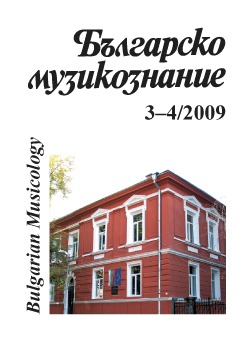Музикалнонаучното институционално строителство
Music-Scientific Institutional Construction
Author(s): Dimiter ChristoffSubject(s): Music
Published by: Институт за изследване на изкуствата, Българска академия на науките
Summary/Abstract: The text is dedicated to the music-scientific institutional construction, ie to the activity of organizing institutions, their existence today or in the past, the intentions for them and the place of the musicologists in these structures. A specific object of examination is the situation in Bulgaria, compared to the global practice. Today, in Western and Central Europe, including the United States and Canada, there are dozens of institutions with a focused scope of activities, which work on the project principle, and include in their structures musicologists. These projects are funded by the state, the municipality or with mixed fundings, for example MEDIAKULT in Vienna and the Institute for Comparative Studies in Contemporary Music in Berlin, associated with UNESCO. In Central and Eastern Europe, in the so called new democracies, there are institutions with a permanent presence, dedicated to music research. A typical example is the former Institute of Musicology at BAS in Bulgaria, which was state funded. Nowadays additional fundings are sought for project activities. The observations lead to the following basic conclusions. First, in the professional realization of musicologists are intertwined musicological activities of different genres, caused by the instability of the music-scientific institutions, which construction/ existence is in constant motion. Second, the music-scientific institutions are often intertwined in more general structures and have no internal focus. Third, the detached music-scientific institutions as independent institutions (Vienna, Berlin) are much more promising and perspective. The dynamics of existence within these institutions are governed by general principles: one is the notion of phases; second – notion for change; third – multiplicative, growing notion. In Bulgaria the radical historical shocks, based on conflicting views about the ownership and management, are shaking the musicology too. In Tzarska Bulgaria the government was much more foresighted and responded adequately to the musicological enthusiasm (this was a period of accumulation). In the second half of the twentieth century, the government was engaged directly with the music-science institutional construction. The government founded the Institute of Musicology in 1948 (it was initiative of the composer Petko Staynov). The Institute existed until 1988 and continually expanded its activity. Since 1988 the musicologists, along with their internal structures, staff members, and the magazine Bulgarian Musicology have joined the new Institute of Art Studies at BAS. The radical change in 1988 had a negative impact and the musicological work has declined at the expense of other compensatory activities. In perspective can be expected a further narrowing of the field of Bulgarian musicology and its existential security. This will probably affect not only the Bulgarian Academy of Science (BAS), but also the pedagogical institutions due to a diminished...
Journal: Българско музикознание
- Issue Year: 2009
- Issue No: 3-4
- Page Range: 116-122
- Page Count: 7
- Language: Bulgarian
- Content File-PDF

